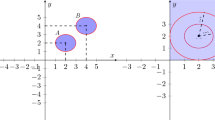Abstract
The present study is devoted to define a new notion of approximate weak minimal solution based on a set order relation introduced by Karaman et al. (Positivity 22(3):783–802, 2018) for a constrained set optimization problem. Sufficient conditions have been found for the closedness of minimal solution sets. Using the Painlevé–Kuratowski convergence, the stability aspects of the approximate weak minimal solution sets are discussed. Further, a notion of Levitin–Polyak well-posedness for the set optimization problem is introduced. Sufficiency criteria and some characterizations of the above defined well-posedness are established. An alternative approach to obtain robust solutions for uncertain vector optimization problems is discussed as an application.
Similar content being viewed by others
References
Bao, T.Q., Mordukhovich, B.S.: Set-valued optimization in welfare economics. Adv. Math. Econ. 13, 113–153 (2010)
Hamel, A.H., Heyde, F., Löhne, A., Rudloff, B., Schrage, C.: Set optimization—a rather short introduction. In: Hamel, A.H. (ed.) Set Optimization and Applications—The State of the Art, pp. 65–141. Springer, Berlin (2015)
Khan, A.A., Tammer, C., Zǎlinescu, C.: Set-Valued Optimization: An Introduction with Applications. Springer, Berlin (2015)
Ide, J., Köbis, E.: Concepts of efficiency for uncertain multi-objective optimization problems based on set order relations. Math. Methods Oper. Res. 80(1), 99–127 (2014)
Ansari, Q.H., Köbis, E., Sharma, P.K.: Characterizations of multiobjective robustness via oriented distance function and image space analysis. J. Optim. Theory Appl. 181(3), 817–839 (2019)
Neukel, N.: Order relations of sets and its application in socio-economics. Appl. Math. Sci. 7, 5711–5739 (2013)
Aubin, J.P., Frankowska, H.: Set-Valued Analysis, Modern Birkhäuser Classics. Birkhäuser Boston Inc., Boston (2009)
Kuroiwa, D.: Some duality theorems of set-valued optimization with natural criteria. In: Proceedings of the International Conference on Nonlinear Analysis and Convex Analysis, pp. 221–228. World Scientific River Edge (1999)
Karaman, E., Soyertem, M., Güvenç, I.A., Tozkan, D., Küçük, M., Küçük, Y.: Partial order relations on family of sets and scalarizations for set optimization. Positivity 22(3), 783–802 (2018)
Preechasilp, P., Wangkeeree, R.: A note on semicontinuity of the solution mapping for parametric set optimization problems. Optim. Lett. 13(5), 1085–1094 (2019)
Kutateladze, S.S.: Convex \(\epsilon \)-programming. Sov. Math. Dokl. 20, 391–393 (1979)
Loridan, P.: \(\epsilon \)-Solutions in vector minimization problems. J. Optim. Theory Appl. 43, 265–276 (1984)
Gutiérrez, C., Jiménez, B., Novo, V.: Optimality conditions via scalarization for a new \(\epsilon \)-efficiency concept in vector optimization problems. Eur. J. Oper. Res. 201, 11–22 (2010)
Gutiérrez, C., Huerga, L., Jiménez, B., Novo, V.: Approximate solutions of vector optimization problems via improvement sets in real linear spaces. J. Glob. Optim. 70, 875–901 (2018)
Dhingra, M., Lalitha, C.S.: Approximate solutions and scalarization in set-valued optimization. Optimization 66, 1793–1805 (2017)
Dontchev, A.L., Zolezzi, T.: Well-Posed Optimization Problems. Lecture Notes in Mathematics. Springer, Berlin (1993)
Bednarczuck, E.M.: An approach to well-posedness in vector optimization: consequences to stability and parametric optimization. Control Cybern. 23, 107–122 (1994)
Crespi, G.P., Papalia, M., Rocca, M.: Extended well-posedness of quasiconvex vector optimization problems. J. Optim. Theory Appl. 141(2), 285–297 (2009)
Zhu, L., Xia, F.: Scalarization method for Levitin–Polyak well-posedness of vectorial optimization problems. Math. Methods Oper. Res. 76, 361–375 (2012)
Chatterjee, P., Lalitha, C.S.: Scalarization of Levitin–Polyak well-posedness in vector optimization using weak efficiency. Optim. Lett. 9, 329–343 (2015)
Zhang, W.Y., Li, S.J., Teo, K.L.: Well-posedness for set optimization problems. Nonlinear Anal. 71, 3769–3778 (2009)
Long, X.J., Peng, J.W.: Generalized B-well-posedness for set optimization problems. J. Optim. Theory Appl. 157, 612–623 (2013)
Crespi, G.P., Dhingra, M., Lalitha, C.S.: Pointwise and global well-posedness in set optimization: a direct approach. Ann. Oper. Res. 269, 149–166 (2018)
Khoshkhabar-amiranloo, S.: Characterizations of generalized Levitin–Polyak well-posed set optimization problems. Optim. Lett. 13, 147–161 (2019)
Gupta, M., Srivastava, M.: Well-posedness and scalarization in set optimization involving ordering cones with possibly empty interior. J. Glob. Optim. 73, 447–463 (2019)
Ansari, Q.H., Sharma, P.K., Yao, J.C.: Minimal element theorems and Ekeland’s variational principle with new set order relations. J. Nonlinear Convex Anal. 19, 1127–1139 (2018)
Khushboo, Lalitha, C.S.: Scalarizations for a set optimization problem using generalized oriented distance function. Positivity 23(5), 1195–1213 (2019)
Kuroiwa, D.: On duality of set-valued optimization—research on nonlinear analysis and convex analysis. Sūrikaisekikenkyūsho Kōkyūroku 1071, 12–16 (1998)
Karuna, Lalitha C.S.: External and internal stability in set optimization. Optimization 68(4), 833–852 (2019)
Kuratowski, K.: Topology, vol. 1 and 2. Academic Press, New York (1968)
Luc, D.T.: Theory of Vector Optimization. Lecture Notes in Economics and Mathematics Systems, vol. 319. Springer, New York (1989)
Acknowledgements
The authors are indebted to Prof. Mauro Pontani and all the referees for their constructive remarks and observations which in turn helped us immensely in improving the content and presentation of this paper.
Author information
Authors and Affiliations
Corresponding author
Additional information
Communicated by Mauro Pontani.
Publisher's Note
Springer Nature remains neutral with regard to jurisdictional claims in published maps and institutional affiliations.
Rights and permissions
About this article
Cite this article
Gupta, M., Srivastava, M. Approximate Solutions and Levitin–Polyak Well-Posedness for Set Optimization Using Weak Efficiency. J Optim Theory Appl 186, 191–208 (2020). https://doi.org/10.1007/s10957-020-01683-0
Received:
Accepted:
Published:
Issue Date:
DOI: https://doi.org/10.1007/s10957-020-01683-0



